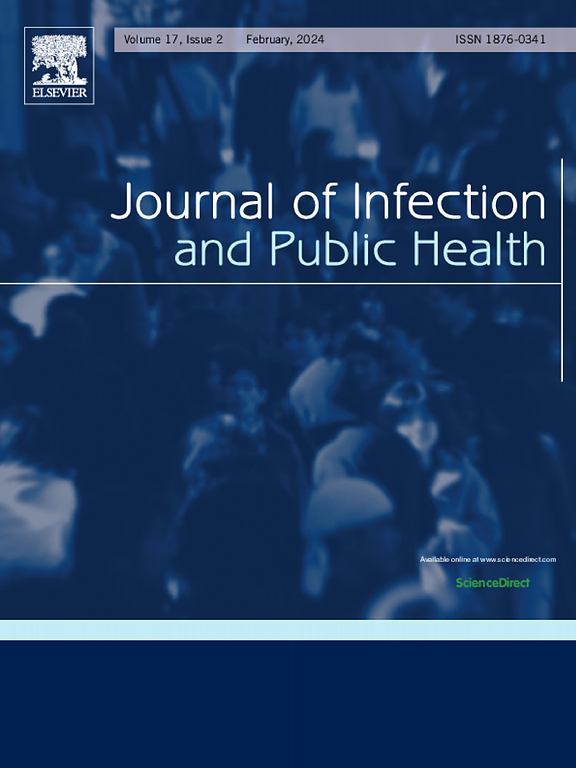m痘感染:2024年突发公共卫生事件后流行病学、分子和临床方面的最新概况
IF 4
3区 医学
Q1 INFECTIOUS DISEASES
引用次数: 0
摘要
猴痘病毒(MPXV)引起的猴痘在2024年重新成为一个重大的全球卫生问题,导致宣布第二次国际关注的突发公共卫生事件(PHEIC)。Ib枝状分支在中非的出现,特别是对儿童和免疫功能低下个体的影响,以及IIb枝状分支在全球的持续传播引起了人们对传播性和毒力增加的担忧,这可能是由apobec3介导的病毒突变加速引起的。新的疫苗接种策略包括已获许可的JYNNEOS和日本的LC16 KMB,以及目前正在临床试验的有前景的mRNA候选疫苗。尽管抗病毒治疗,如替科维莫、西多福韦和布里多福韦仍然有效,但免疫功能低下患者中正在出现耐药性。加强诊断,包括世卫组织批准的快速分子检测,以及减少人畜共患病风险和公平分配疫苗等预防战略至关重要。持续的基因组监测、加强的全球监测和跨学科合作对于预防未来的疫情暴发和加强全球防范至关重要。本文章由计算机程序翻译,如有差异,请以英文原文为准。
Mpox infection: A state-of-the-art overview of epidemiological, molecular, and clinical aspects following the 2024 public health emergency
Mpox, caused by the monkeypox virus (MPXV), re-emerged as a significant global health issue in 2024, resulting in the declaration of a second Public Health Emergency of International Concern (PHEIC). The emergence of Clade Ib in Central Africa, particularly affecting children and immunocompromised individuals, and the ongoing global spread of Clade IIb have raised concerns about increased transmissibility and virulence, potentially driven by accelerated APOBEC3-mediated viral mutations. Novel vaccination strategies include the licensed JYNNEOS and Japan’s LC16 KMB, as well as promising mRNA vaccine candidates currently in clinical trials. Although antiviral therapies, such as tecovirimat, cidofovir, and brincidofovir, remain effective, resistance is emerging among immunocompromised patients. Enhanced diagnostics, including WHO-approved rapid molecular tests, along with preventive strategies such as zoonotic risk reduction and equitable vaccine distribution, are critical. Continued genomic monitoring, enhanced global surveillance and interdisciplinary collaboration are essential to prevent future outbreaks and strengthen global preparedness.
求助全文
通过发布文献求助,成功后即可免费获取论文全文。
去求助
来源期刊

Journal of Infection and Public Health
PUBLIC, ENVIRONMENTAL & OCCUPATIONAL HEALTH -INFECTIOUS DISEASES
CiteScore
13.10
自引率
1.50%
发文量
203
审稿时长
96 days
期刊介绍:
The Journal of Infection and Public Health, first official journal of the Saudi Arabian Ministry of National Guard Health Affairs, King Saud Bin Abdulaziz University for Health Sciences and the Saudi Association for Public Health, aims to be the foremost scientific, peer-reviewed journal encompassing infection prevention and control, microbiology, infectious diseases, public health and the application of healthcare epidemiology to the evaluation of health outcomes. The point of view of the journal is that infection and public health are closely intertwined and that advances in one area will have positive consequences on the other.
The journal will be useful to all health professionals who are partners in the management of patients with communicable diseases, keeping them up to date. The journal is proud to have an international and diverse editorial board that will assist and facilitate the publication of articles that reflect a global view on infection control and public health, as well as emphasizing our focus on supporting the needs of public health practitioners.
It is our aim to improve healthcare by reducing risk of infection and related adverse outcomes by critical review, selection, and dissemination of new and relevant information in the field of infection control, public health and infectious diseases in all healthcare settings and the community.
 求助内容:
求助内容: 应助结果提醒方式:
应助结果提醒方式:


